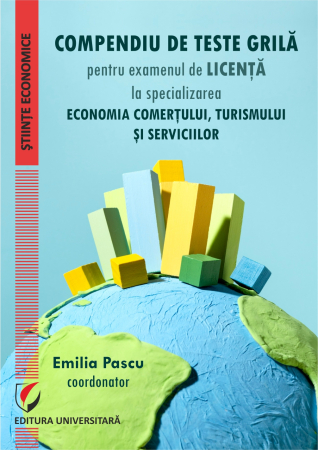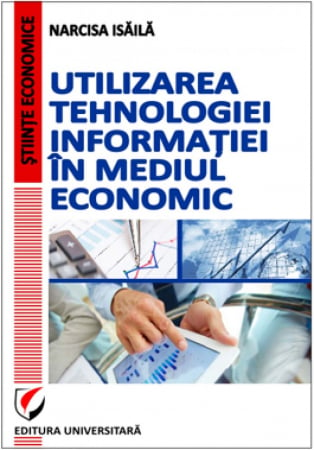Manuscript proposals: [email protected] / 0745 204 115 //// Tracking orders Individuals / Sales: 0745 200 357 / Orders Legal entities: 0721 722 783
Publisher: Editura Universitară
Author: Andreea-Daniela Gangone
ISBN: 978-606-28-0021-5
DOI: 10.5682/9786062800215
Publisher year: 2014
Edition: I
Pages: 142
Product Code:
9786062800215
Do you need help?
0745 200 357
- Description
- Download (1)
- Authors
- Content
- More details
- Reviews (0)
This book is a way to popularize the concept of corporate social responsibility in the academic environment, but also in the Romanian business environment, and to provide the conceptual and instrumental foundation necessary to stimulate the creativity of future Romanian businessmen and managers, so that they acquire the first skills necessary to adapt the concepts, methods and techniques of corporate social responsibility to the reality of the organizations they manage.
-
RESPONSABILITATE SOCIALA CORPORATISTA. Repere conceptuale. Abordari strategice. Particularitati culturale
Download
ANDREEA-DANIELA GANGONE
FOREWORD / 7
PART I
SOCIAL RESPONSIBILITY OF CONTEMPORARY ORGANIZATIONS / 11
I.1 Social critiques of contemporary business / 11
I.2 Stages in the social transformation of economic organizations. Outlining the organization 's social responsibility policy / 17
I.3 Corporate social responsibility in the specialized literature / 27
I.4 Advantages and disadvantages of the assumption of social responsibilities by contemporary organizations / 39
PART II
CONTINUITY AND EFFICIENCY IN THE SOCIAL RESPONSIBILITY POLICY OF THE ORGANIZATION. SOCIAL RESULTS PLANNING / 42
II.1 The process of creating the socially responsible organization - the organizational dimension and the social dimension. Training of social managers / 42
II.2 Stages in the process of planning the social results of the organization / 47
II.3 Forms of manifestation of the social responsibility of the organization / 61
II.4 Analysis of the types of social responsibility strategies of the Organization / 69
II.5 Models of corporate social responsibility established in international practice / 74
PART III
SOCIAL RESPONSIBILITY OF THE ORGANIZATION IN THE CONTEXT OF CONTEMPORARY CULTURAL DIVERSITY / 83
III.1 The relationship between organizational culture - business ethics - social responsibility in contemporary organizations / 83
III.2 International regulation of the social responsibility of economic organizations / 93
III.3 Maturation of management in Romanian organizations by assuming ethical and social responsibilities / 101
III.4 General model of social responsibility with applicability in the activity of Romanian organizations / 125
BIBLIOGRAPHY / 133
PART I
SOCIAL RESPONSIBILITY OF CONTEMPORARY ORGANIZATIONS / 11
I.1 Social critiques of contemporary business / 11
I.2 Stages in the social transformation of economic organizations. Outlining the organization 's social responsibility policy / 17
I.3 Corporate social responsibility in the specialized literature / 27
I.4 Advantages and disadvantages of the assumption of social responsibilities by contemporary organizations / 39
PART II
CONTINUITY AND EFFICIENCY IN THE SOCIAL RESPONSIBILITY POLICY OF THE ORGANIZATION. SOCIAL RESULTS PLANNING / 42
II.1 The process of creating the socially responsible organization - the organizational dimension and the social dimension. Training of social managers / 42
II.2 Stages in the process of planning the social results of the organization / 47
II.3 Forms of manifestation of the social responsibility of the organization / 61
II.4 Analysis of the types of social responsibility strategies of the Organization / 69
II.5 Models of corporate social responsibility established in international practice / 74
PART III
SOCIAL RESPONSIBILITY OF THE ORGANIZATION IN THE CONTEXT OF CONTEMPORARY CULTURAL DIVERSITY / 83
III.1 The relationship between organizational culture - business ethics - social responsibility in contemporary organizations / 83
III.2 International regulation of the social responsibility of economic organizations / 93
III.3 Maturation of management in Romanian organizations by assuming ethical and social responsibilities / 101
III.4 General model of social responsibility with applicability in the activity of Romanian organizations / 125
BIBLIOGRAPHY / 133
At the beginning of the millennium, the contemporary world is facing a unique general situation, marked by strong contradictions. Never before has mankind benefited from better living conditions provided by the conquests of technical and scientific progress, but at the same time it has never been more powerless in the face of the threat of social problems affecting more than two-thirds of the world's population. .
This serious situation was determined by the narrow way in which the process of economic development was managed during the period of savage capitalism, the period in which economic agents around the world completely ignored the principles of ethics and developed their business in an individualistic and irresponsible manner. the name of obtaining the highest possible profits.
This economic period was characterized, for this reason, by ignoring all partners interested in the activity of organizations, except shareholders, and determined the concentration of the planet's wealth in the hands of a small number of states, condemning other nations to a state of relative poverty, or even extreme, and to a situation of inadmissible dependence.
The effects of this evolution were the inadequate treatment of consumers, human rights and employee violations, the creation of an exaggerated consumption mentality, the serious damage to the integrity of the natural environment, the waste of limited natural resources, the exploitation of children, the denial of access to education. and to the minimum necessary for subsistence.
Awareness of the economic world occurred, literally, in the twelfth hour, when the ecological and social problems faced by virtually all contemporary societies could no longer be ignored.
The central idea from which we started in the elaboration of this paper was the indissoluble link that must be based between the process of social development of humanity and the economic affairs sector, as the main factor supporting this process, facilitated by the prompt and equitable intervention of institutions. nation states.
The reason for supporting the importance and, especially, the legitimacy of this connection, lies in the fact that businesses were created not only to enrich the owners, but also to support the communities in which they operate, whose human resources, materials , financial and natural are used and that allow them to obtain profit.
In this sense, in this paper we have made a detailed analysis of the factors that determined the change of perspective in the global economic world, in the sense of reconsidering its essential mission in terms of extended ethical and social responsibility, and we structured the diversity of approaches to the concept of responsibility. corporate social skills present in the literature, according to an original methodology.
Also, for the social transformation of contemporary organizations to lead to an increase in their competitiveness and efficiency, it is necessary for them to integrate the new social responsibilities in their long-term business strategy. Thus, in the second part of the paper we presented an original vision on the process of developing a high-performance social responsibility policy, by implementing an organization to enhance its economic and social results, approached in an organic and synergistic manner, without producing a damaging split between the economic benefits and the social benefits it generates.
Corporate social responsibility can be considered, therefore, a new business philosophy whose adoption implies, however, a complete organizational change and the shaping of a richer and more open organizational culture to communicate with society. For this reason, in Part III of the paper we argued the role of organizational culture in the effort of ethical and social responsibility of organizations, we analyzed corporate social responsibility from the perspective of contemporary cultural diversity and argued the need for international regulation of socially responsible organizational behavior.
The paper concludes with an assessment of the degree of ethical and social responsibility achieved by the representatives of the Romanian business environment, on the basis of which we based a model of social responsibility with applicability in the activity of Romanian organizations. Due to the fact that it establishes the steps to be followed, offering, at the same time, some concrete examples of principles and actions of ecological, ethical and social responsibility, this model of social responsibility can be applied, I consider, successfully, in a large number of Romanian organizations, from different fields of activity.
I consider that this book is a way to popularize the concept of corporate social responsibility in the academic environment, but also in the Romanian business environment, and to provide foundation the conceptual and instrumental necessary to stimulate the creativity of future Romanian businessmen and managers, so that they acquire the first skills necessary to adapt the concepts, methods and techniques of corporate social responsibility to the reality of the organizations they manage.
The author
This serious situation was determined by the narrow way in which the process of economic development was managed during the period of savage capitalism, the period in which economic agents around the world completely ignored the principles of ethics and developed their business in an individualistic and irresponsible manner. the name of obtaining the highest possible profits.
This economic period was characterized, for this reason, by ignoring all partners interested in the activity of organizations, except shareholders, and determined the concentration of the planet's wealth in the hands of a small number of states, condemning other nations to a state of relative poverty, or even extreme, and to a situation of inadmissible dependence.
The effects of this evolution were the inadequate treatment of consumers, human rights and employee violations, the creation of an exaggerated consumption mentality, the serious damage to the integrity of the natural environment, the waste of limited natural resources, the exploitation of children, the denial of access to education. and to the minimum necessary for subsistence.
Awareness of the economic world occurred, literally, in the twelfth hour, when the ecological and social problems faced by virtually all contemporary societies could no longer be ignored.
The central idea from which we started in the elaboration of this paper was the indissoluble link that must be based between the process of social development of humanity and the economic affairs sector, as the main factor supporting this process, facilitated by the prompt and equitable intervention of institutions. nation states.
The reason for supporting the importance and, especially, the legitimacy of this connection, lies in the fact that businesses were created not only to enrich the owners, but also to support the communities in which they operate, whose human resources, materials , financial and natural are used and that allow them to obtain profit.
In this sense, in this paper we have made a detailed analysis of the factors that determined the change of perspective in the global economic world, in the sense of reconsidering its essential mission in terms of extended ethical and social responsibility, and we structured the diversity of approaches to the concept of responsibility. corporate social skills present in the literature, according to an original methodology.
Also, for the social transformation of contemporary organizations to lead to an increase in their competitiveness and efficiency, it is necessary for them to integrate the new social responsibilities in their long-term business strategy. Thus, in the second part of the paper we presented an original vision on the process of developing a high-performance social responsibility policy, by implementing an organization to enhance its economic and social results, approached in an organic and synergistic manner, without producing a damaging split between the economic benefits and the social benefits it generates.
Corporate social responsibility can be considered, therefore, a new business philosophy whose adoption implies, however, a complete organizational change and the shaping of a richer and more open organizational culture to communicate with society. For this reason, in Part III of the paper we argued the role of organizational culture in the effort of ethical and social responsibility of organizations, we analyzed corporate social responsibility from the perspective of contemporary cultural diversity and argued the need for international regulation of socially responsible organizational behavior.
The paper concludes with an assessment of the degree of ethical and social responsibility achieved by the representatives of the Romanian business environment, on the basis of which we based a model of social responsibility with applicability in the activity of Romanian organizations. Due to the fact that it establishes the steps to be followed, offering, at the same time, some concrete examples of principles and actions of ecological, ethical and social responsibility, this model of social responsibility can be applied, I consider, successfully, in a large number of Romanian organizations, from different fields of activity.
I consider that this book is a way to popularize the concept of corporate social responsibility in the academic environment, but also in the Romanian business environment, and to provide foundation the conceptual and instrumental necessary to stimulate the creativity of future Romanian businessmen and managers, so that they acquire the first skills necessary to adapt the concepts, methods and techniques of corporate social responsibility to the reality of the organizations they manage.
The author
If you want to express your opinion about this product you can add a review.
write a review

6359.png)
![Corporate Social Responsibility Highlights conceptual. Strategic approach. Cultural features [1] Corporate Social Responsibility Highlights conceptual. Strategic approach. Cultural features [1]](https://gomagcdn.ro/domains/editurauniversitara.ro/files/product/large/responsabilitate-sociala-corporatista-repere-conceptuale-abordari-strategice-particularitati-culturale-1004-988200.jpg)














